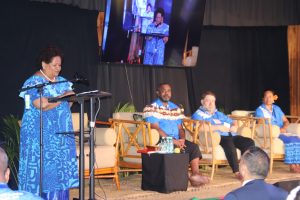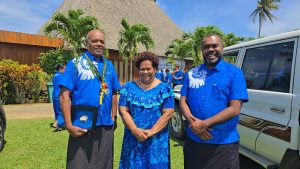

The region has convened its inaugural Research Symposium on Loss and Damage in Small Island Developing States (SIDS). Held in Savusavu, Fiji and co-hosted by the Pacific Community (SPC), the Fiji National University (FNU) and Monash University, the three-day event is bringing together more than 150 researchers, policymakers and community leaders to strengthen the evidence base for addressing the irreversible impacts of climate change.
Loss and Damage refers to the permanent costs of climate change that go beyond adaptation from the destruction of homes and crops by cyclones, to saltwater intrusion that makes land uninhabitable, and the erosion of cultural heritage when villages are forced to relocate.
The symposium is made possible with major funding from the Ministry of Foreign Affairs of Denmark and the Pacific Action for Climate Transitions (PACT) Research Centre, with additional support from the New Zealand Ministry of Foreign Affairs and Trade (MFAT).
For decades, Pacific Island countries have been at the forefront of international advocacy on this issue, helping to secure the establishment of a global Loss and Damage Fund at COP27 and its operationalisation at COP28.
Yet, despite these milestones, Pacific negotiators continue to face challenges in accessing finance due to a lack of locally generated data and methodologies that reflect island realities.
Opening the symposium, Hon Mosese Bulitavu, Minister for Environment and Climate Change said Loss and Damage is already shaping the lives of Pacific communities.
“Cyclone Winston wiped out one-third of our economy in just 36 hours. These are not projections this is our reality. This symposium strengthens our negotiating position and helps design systems that truly serve those most at risk. Fiji has already taken pioneering steps, from enacting the Climate Change Act 2021 to establishing the Climate Relocation of Communities Trust Fund.”
Hon. Minister Bulitavu added that Fiji has already relocated six villages, with 17 more awaiting urgent action, highlighting why Pacific-led research is critical for future planning.
Ms Maria Fuata, SPC Deputy Director-General for Operations and Integration, said the focus must remain on practical outcomes and this symposium is about ensuring evidence translates into systems change.
“This is about knowledge that governments can use for relocation planning, for water security, for accessing finance. By bringing together lived experience, traditional knowledge and scientific data, we can shape responses that are regionally led and globally credible.”
Ms Fuata further stressed that SPC along with its key partners, FNU and the Monash University are supporting members in turning research into applied solutions, ensuring Pacific realities are visible in global policy debates.
The three-day symposium includes sessions on the operationalisation of the Loss and Damage Fund, regional water security, and the non-economic dimensions of climate change such as the loss of culture, heritage and identity. Presentations are being delivered by a mix of national governments, regional organisations, multilateral development banks, private sector specialists and Pacific universities, reflecting the breadth of expertise needed to build an evidence base for action.
Professor Paul Dargusch, Director of the Pacific Action for Climate Transitions Research Centre at Monash University, said the event demonstrates the importance of linking science and policy.
“Strong policy depends on strong evidence. By bringing governments, researchers and regional organisations together, this symposium builds the case for finance that flows directly to Pacific communities.”
He added that credible research is essential for accessing the Loss and Damage Fund and ensuring resources reach the most vulnerable.
Highlighting the urgency of climate action and the role of Pacific institutions, Professor Unaisi Nabobo-Baba, Vice-Chancellor of Fiji National University, said the symposium is a moment to turn words into impact.

“Our islands resist their future under water, and our people persist to survive the impacts of climate change. At FNU, we are committed to strengthening partnerships on loss and damage, and to finding solutions together. This symposium must be more than words it is in our communities that our thinking must show impact. With powerhouses from across the Pacific gathered here, I believe this symposium will spark real change.”
She added that FNU is committed to embedding traditional knowledge alongside scientific methods, ensuring that Pacific research reflects the realities of island communities.
The symposium runs from 16–18 September 2025 in Savusavu, Fiji. Findings will inform national systems, strengthen Pacific negotiating positions, and guide the implementation of the Loss and Damage Fund ahead of COP30.